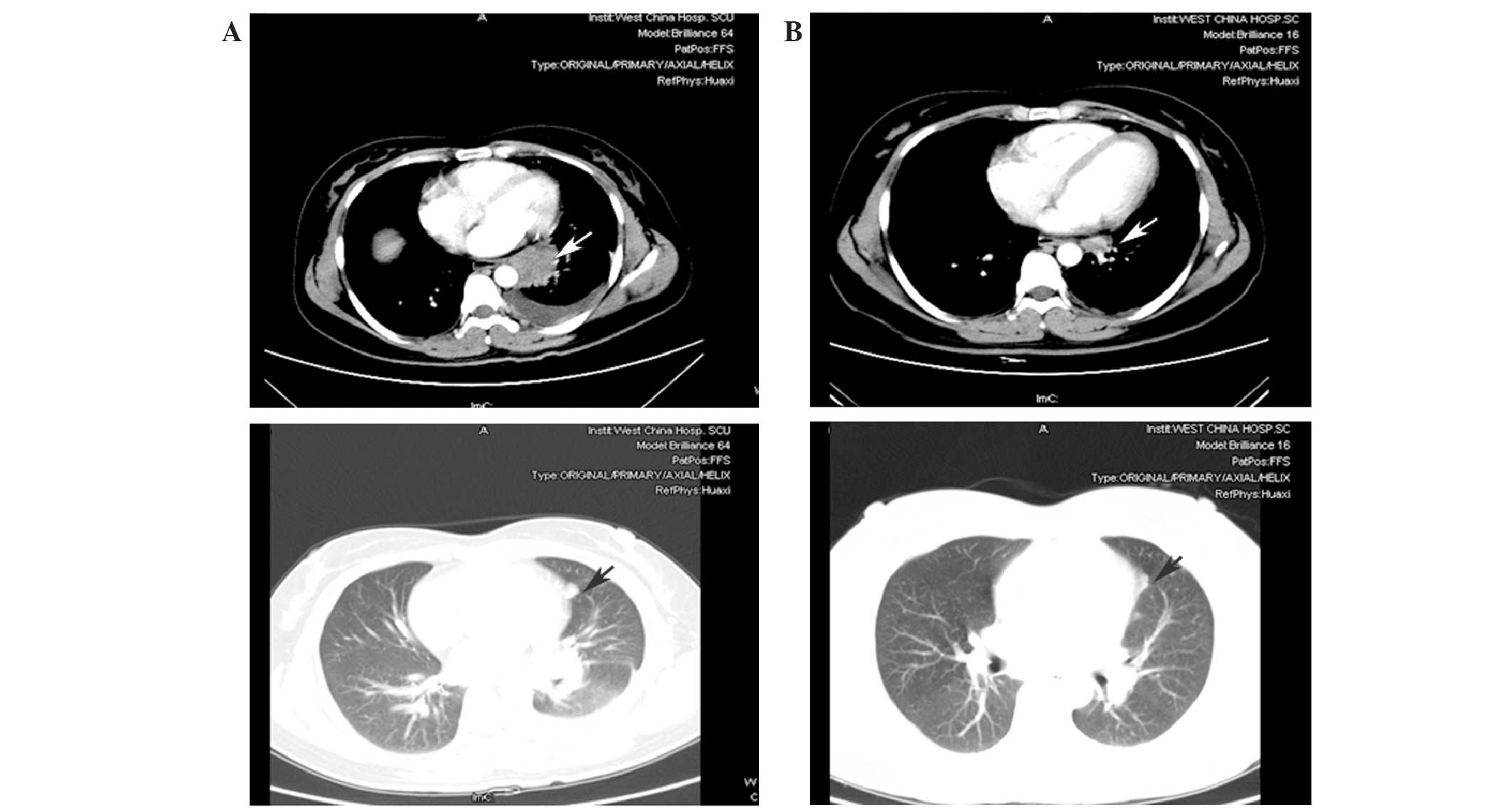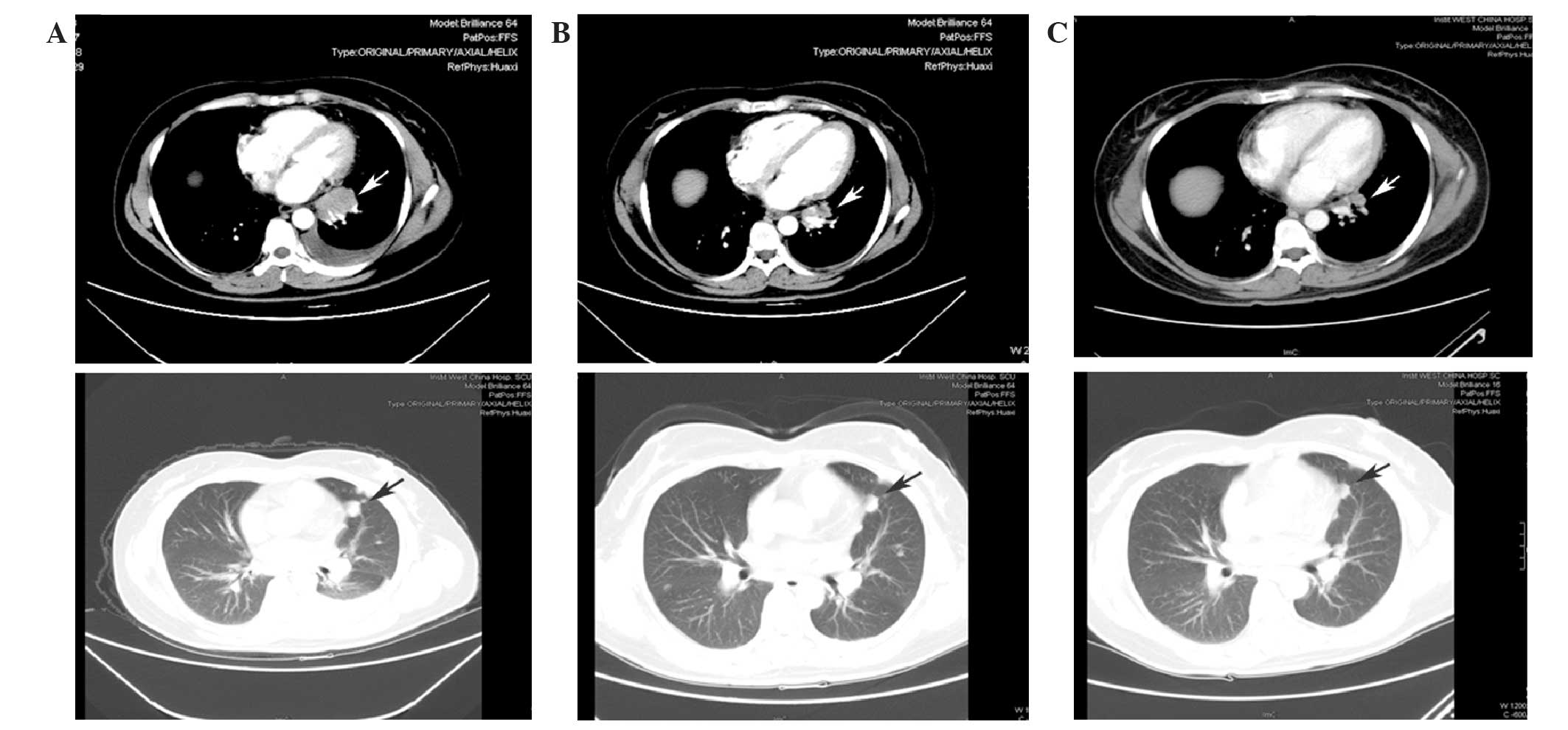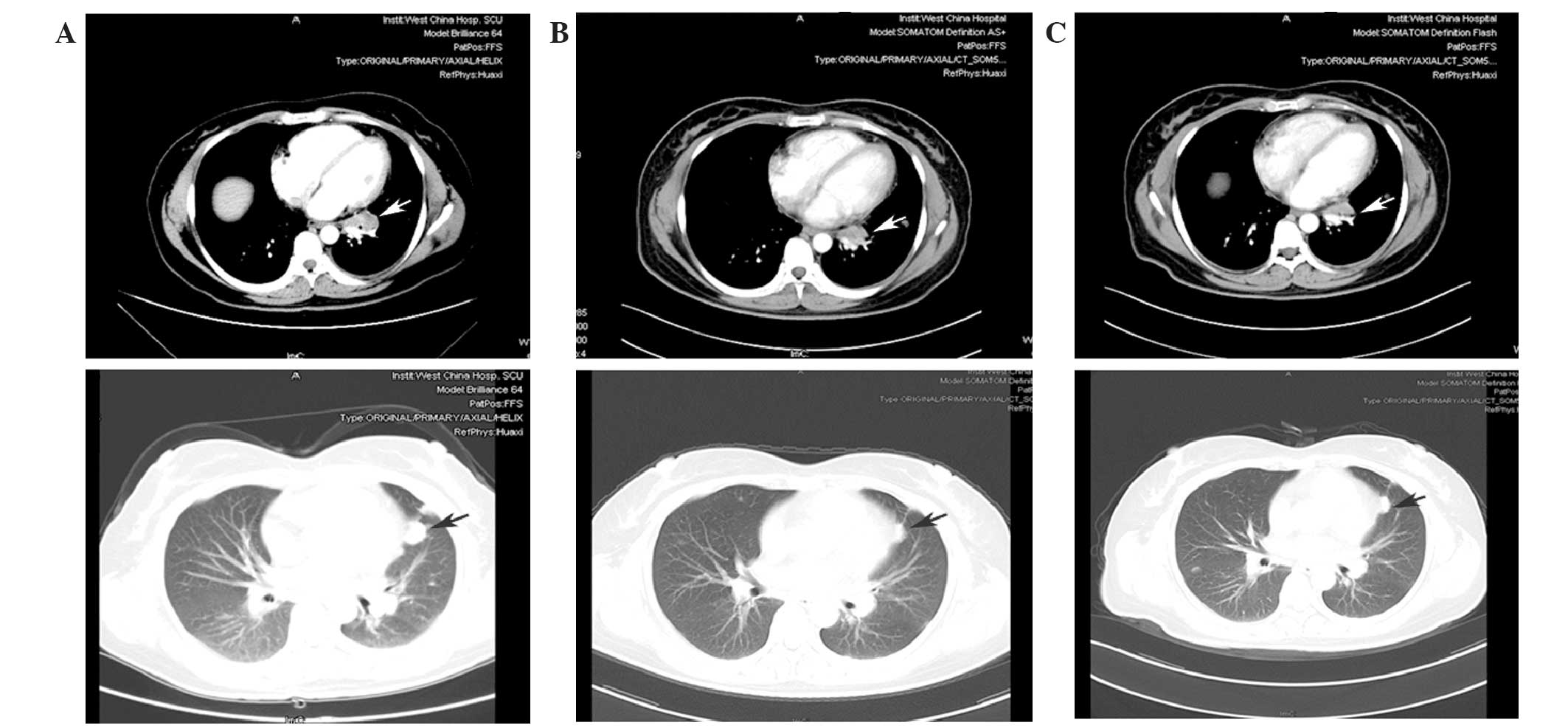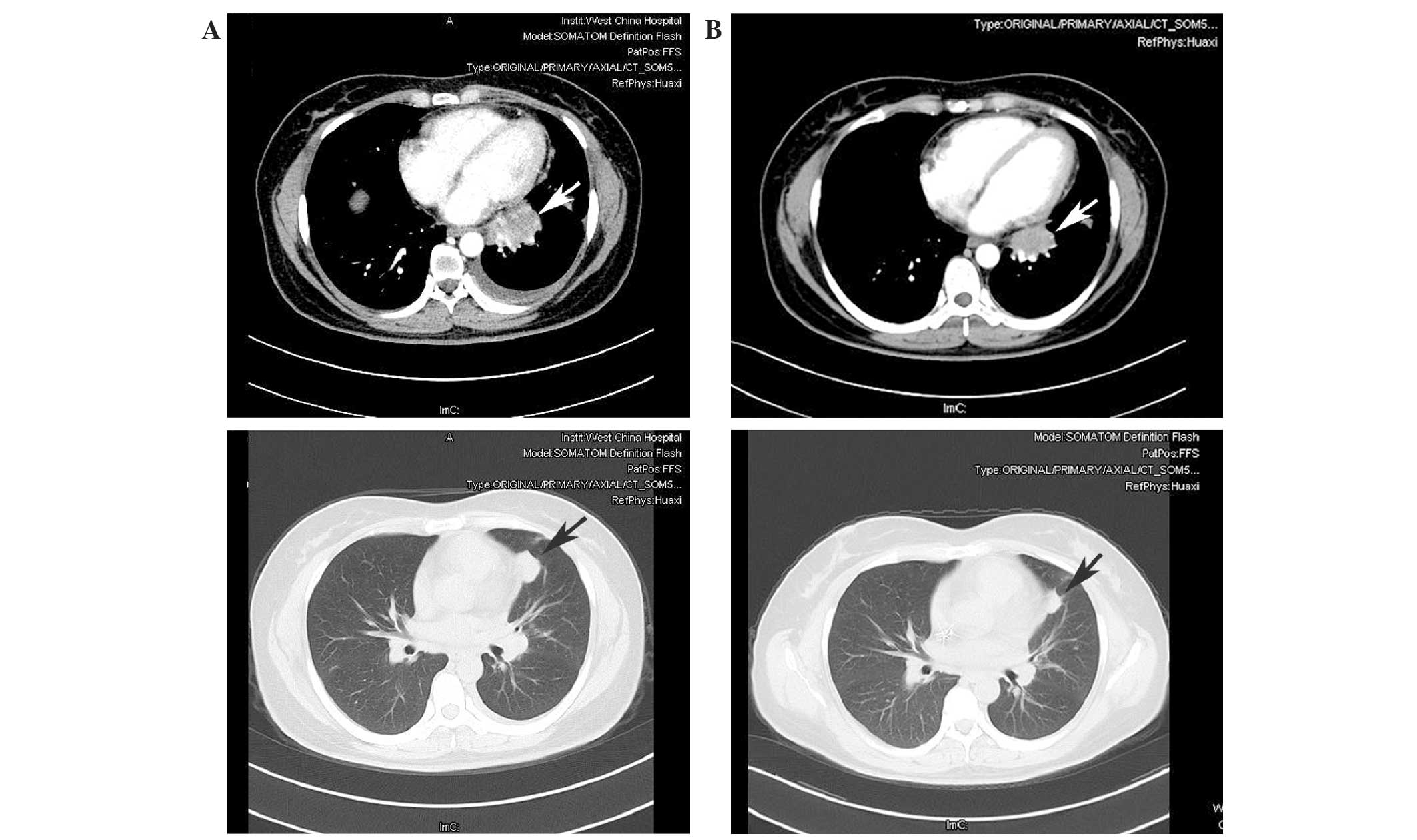Introduction
In 2014, lung cancer was predicted to account for
26% of all female and 28% of all male cancer-related mortalities in
the USA (1). Among all lung cancers,
∼85% are non-small cell lung cancer (NSCLC) and the majority of
patients are diagnosed at an advanced stage. Adenocarcinoma and
squamous cell carcinoma (SCC) are the most common histological
subtypes, accounting for 50% and 30% of NSCLC cases, respectively
(2). Gemcitabine and carboplatin
chemotherapy is a well-tolerated regimen against NSCLC, however,
the efficiency rate is only 20–40% (3).
Excision repair cross complementation 1 gene (ERCC1)
is involved in the repair of DNA damage caused by cisplatin,
indicating an association between ERCC1 expression and cisplatin
sensitivity. Furthermore, a previous study reported that ERCC1
expression levels were negatively correlated with cisplatin
efficacy (4). Ribonucleotide
reductase converts ribonucleotide 5′-diphosphate to
deoxyribonucleotide 5′-diphosphate, which is the key step required
for DNA synthesis (5). Ribonucleotide
reductase M1 subunit (RRM1) encodes the regulatory subunit of
ribonucleotide reductase, which has been identified as a notable
candidate biomarker, particularly with regard to the response to
gemcitabine (6,7). A previous study indicated that patients
with low RRM1 expression in tumor tissue had a greater median
survival time (8). Therefore, the
detection of ERCC1 and RRM1 may facilitate the selection of
individuals or groups that will gain the greatest benefit from
chemotherapy.
The current study reports the case of a patient with
advanced squamous lung carcinoma harboring low ERCC1 and RRM1
expression levels and treated with multiple lines of
chemotherapy.
Case report
In March 2010, a 37-year-old female presented to the
West China Hospital (Chengdu, Sichuan, China) with a mildly
productive cough and chest pain. A general examination indicated an
enlarged left supraclavicular lymph node, and the patient underwent
a chest computed tomography (CT) scan. The results revealed a mass
in the basal segment of the left lung, enlarged lymph nodes in the
mediastinum and left lung hilum, and multiple small nodes in the
left lung (Fig. 1). Biopsy was
performed using a bronchofiberscope, and the histological
examination indicated squamous cell carcinoma (SCC) of the lung,
with typical morphological characteristics (9). Subsequent immunohistochemical evaluation
revealed positive staining for epithelial membrane antigen and
pancytokeratin, and negative staining for desmin, smooth muscle
actin, S-100, vimentin and cluster of differentiation 1a.
Fluorescence in situ hybridization indicated that
Epstein-Barr virus encoded RNA was negative. An amplication
refractory mutation system showed negative results for epidermal
growth factor receptor (EGFR) mutation in exons 18, 19, 20 and 21.
Real-time polymerase chain reaction indicated a relative mRNA
expression of 6.69×10−3 for ERCC1 and
8.279×10−3 for RRM1, which was measured relative to the
β-actin house-keeping gene, as previously described (10). The patient was consequently diagnosed
with advanced SCC of the lung (cT4N3M1a, stage IV).
In April 2010, the patient received cisplatin plus
gemcitabine (GP) chemotherapy for 2 cycles (gemcitabine, 1,000
mg/m2 days 1 and 8; cisplatin, 25 mg/m2, days
1–3), resulting in partial remission (PR). The patient participated
in the clinical trial ‘Combination chemotherapy with gemcitabine
and cisplatin plus recombinant endostatin (endostar) and
maintenance therapy with endostar in stage IIIB and IV NSCLC’
(registration no. ChiCTR-ONC-08000162), and received 2 cycles of GP
regimen, followed by maintenance Endostar for 7 cycles (15 mg, days
1–14; Fig. 1). In March 2011, the
patient showed disease progression (PD), based on the increased
size of the tumor lesions, and commenced a regimen of docetaxel
plus oxaliplatin for 5 cycles (docetaxel, 75 mg/m2, day
1; oxaliplatin, 130 mg/m2, day 1). In March 2012, the
patient presented with a cough and chest pain, and subsequent chest
CT imaging revealed that the pulmonary lesions had grown slightly.
The patient consented to further GP therapy for 4 cycles, resulting
in a PR (Fig. 2). Maintenance
gemcitabine was recommended, however, due to poor compliance, the
patient refused and instead underwent a 1-month course of erlotinib
(150 mg/day), which was self-administered orally. In November 2012,
enhanced CT imaging revealed that the tumor in the basal segment of
the left lung and the lung metastases had increased in size. Due to
the previous treatment response, the patient received the GP
regimen for 4 cycles, achieving another PR (Fig. 3). In June 2013, enhanced CT imaging
revealed that the pulmonary lesions had increased in size and
number, and a state of PD was determined. The patient participated
in the clinical trial ‘Phase I ascending dose tolerance and
pharmacokinetic study of Donafenib’ (Study ID: 2012L02471). The
lung lesions slightly reduced in size, and a stable disease (SD)
state was determined. In January 2014, enhanced CT imaging revealed
that the tumor and the lung metastases had increased in size.
Further GP chemotherapy was administered, and after 2 cycles, the
lung lesions were slightly reduced and evaluated as SD (Fig. 4). Following 4 repeats of the GP
regimen, the patient remained alive and was determined to be in an
SD state. The patient's disease state will be monitored closely,
with follow-up examinations every three months. Due to the
sensitivity of this tumor to chemotherapy drugs, the patient has a
good prognosis. However, if the tumor progresses in the future, a
fifth GP regimen will be adminsitered.
All therapeutic schedules used in the present case
and their effects are summarized in Table
I. Written informed consent was obtained from the patient for
the present study.
 | Table I.Summary of therapeutic schedule and
effects. |
Table I.
Summary of therapeutic schedule and
effects.
| Time | Therapeutic
schedule | Curative effect | Progression of lung
lesions |
|---|
| April 2010 to
December 2010 | 2 cycles of GP
regimen; 2 cycles of GP regimen plus Endostar; maintenance Endostar
for 7 cycles | PR | Growth |
| March 2011 to July
2011 | 5 cycles of DO
regimen | SD | Growth |
| March 2012 to July
2012 | 4 cycles of GP | PR | No growth |
| September 2012 to
October 2012 | Erlotinib for 1
month | PD | Growth |
| November 2012 to
March 2013 | 4 cycles of GP
regimen | PR | Growth plus new
lesions |
| July 2013 to January
2014 | Donafenib for 5
months | SD | Growth |
| January 2014 to March
2014 | 3 cycles of GP
regimen | SD | - |
Discussion
In Western countries, approximately one-third of all
cancer-related mortalities are caused by lung cancer, and NSCLC
accounts for ∼80% of all lung cancer cases, presenting as locally
advanced disease in 25–30% (1,2). Survival
is significantly improved by platinum-based chemotherapy in
patients with advanced NSCLC. However, it is unclear which
platinum-based regimen is the most efficient. A previous
meta-analysis, which evaluated a large dataset of 4,556 patients
from 13 randomized clinical trials, revealed an increased survival
benefit and reduced risk of mortality associated with the
gemcitabine-platinum regimen compared with other non-gemcitabine
platinum-based regimens in patients with advanced NSCLC (11). Meanwhile, in a phase III study
comparing cisplatin plus gemcitabine with cisplatin plus
pemetrexed, patients with squamous cell histology showed a
significant improvement in survival time with cisplatin/gemcitabine
vs. cisplatin/pemetrexed (12). Based
on this evidence, the GP regimen was selected for the current
patient.
During the treatment course, the GP regimen was
administered four times. Each time, the patient benefited following
4 cycles of GP chemotherapy, after which the tumor grew slowly
until a PD state was reached. However, the tumors exhibited
responses to repeated courses of GP, eventually extending the
overall survival time of the patient. In the most recent National
Comprehensive Cancer Network (NCCN) guidelines (13), gemcitabine was recommended for second-
and third-line therapy, but only for gemcitabine-naïve patients.
For SCLC, NCCN guidelines recommended the original effective
regimen if disease progression occurred 6 months after schedule
completion. However, the application of this principle in NSCLC
requires further clinical trial evidence to address whether
patients with a good response to first-line treatment who exhibited
disease progression after a long time interval may benefit from the
original regimen upon repeated administration, how long this time
interval may be and whether alternative chemotherapy regimens were
more effective than the original regimen. These issues remain
unclear, pending further multi-center clinical trials (14,15).
In recent years, research has focused on DNA
analysis in cases of drug resistance to inform the individualized
treatment of lung cancer. ERCC1 is involved in the repair of DNA
damage caused by cisplatin, which suggests an association between
ERCC1 expression and cisplatin sensitivity (16). RRM1, encoding the regulatory subunit
of ribonucleotide reductase, has been identified as a notable
candidate biomarker, particularly with regard to the response to
gemcitabine (17). However, a
randomized phase III trial did not find statistically significant
associations between survival time and RRM1 or ERCC1 levels, thus
genetic analysis-based chemotherapy requires further research
(18). The methods for testing ERCC1
and RRM1 have not been unified, and the level of expression has no
authoritative standard, which presents challenges for RRM1- or
ERCC1-guided chemotherapy. In the current case, the expression
levels of ERCC1 and RRM1 were relatively low, thus repeated GP
chemotherapy may increase the efficiency and improve the overall
survival of the patient.
EGFR mutation-negative patients are predicted to
have a shorter overall survival time, however, the present patient
gained long-term survival after repeated responses to GP
chemotherapy. In addition to sensitivity to gemcitabine, the
patient may also have benefitted from the two clinical trial drugs
administered, Endostar and Donafenib. Endostar is a novel
recombinant human endostatin, which has been demonstrated to
efficiently block angiogenesis and suppress primary tumor growth in
clinical trials (19). Compared with
bevacizumab, which is administered only for non-squamous NSCLC,
Endostar targets the entire tumor endothelial cells and has a broad
anticancer spectrum, which includes SCC. Donafenib is an analogue
of sorafenib, with the same targets and molecular mechanisms.
Similar to adenocarcinoma, SCC exhibits a number of genomic
abnormalities, including fibroblast growth factor receptor 1
amplification, MET amplification, BRAF mutation, discoidin domain
receptor tyrosine kinase 2 mutation and phosphatidylinositol
3-kinase amplification, which renders it sensitive to existing
multi-kinase inhibitors (20).
Although the little available pathological tissue was insufficient
to allow for further testing of certain rare genetic mutations,
Donafenib was effective in the current patient, indicating the
existence of cancer-driving genes in the lung SCC.
EGFR mutation-negative NSCLC patients are expected
to have a shorter overall survival (21–23),
however, the present patient gained a considerable survival benefit
through multiple lines of therapy, including the repeated use of
effective chemotherapy regimens, anti-angiogenic therapy and
multi-kinase inhibitors. In future, individualized therapy based on
predictive biomarkers is a promising strategy for the improvement
of chemotherapy in patients with advanced NSCLC.
References
|
1
|
Siegel R, Ma J, Zou Z and Jemal A: Cancer
statistics, 2014. CA Cancer J Clin. 64:9–29. 2014. View Article : Google Scholar : PubMed/NCBI
|
|
2
|
Ginsberg MS, Grewal RK and Heelan RT: Lung
cancer. Radiol Clin North Am. 45:21–43. 2007. View Article : Google Scholar : PubMed/NCBI
|
|
3
|
Ceppi P, Volante M, Novello S, et al:
ERCC1 and RRM1 gene expressions but not EGFR are predictive of
shorter survival in advanced non-small-cell lung cancer treated
with cisplatin and gemcitabine. Ann Oncol. 17:1818–1825. 2006.
View Article : Google Scholar : PubMed/NCBI
|
|
4
|
Olaussen KA, Dunant A, Fouret P, et al:
IALT Bio Investigators: DNA repair by ERCC1 in non-small-cell lung
cancer and cisplatin-based adjuvant chemotherapy. N Engl J Med.
355:983–991. 2006. View Article : Google Scholar : PubMed/NCBI
|
|
5
|
Jao CY and Salic A: Exploring RNA
transcription and turnover in vivo by using click chemistry. Proc
Natl Acad Sci USA. 105:15779–15784. 2008. View Article : Google Scholar : PubMed/NCBI
|
|
6
|
Tiseo M, Bordi P, Bortesi B, et al:
Bio-FAST trial group: ERCC1/BRCA1 expression and gene polymorphisms
as prognostic and predictive factors in advanced NSCLC treated with
or without cisplatin. Br J Cancer. 108:1695–1703. 2013. View Article : Google Scholar : PubMed/NCBI
|
|
7
|
Su C, Zhou S, Zhang L, et al: ERCC1, RRM1
and BRCA1 mRNA expression levels and clinical outcome of advanced
non-small cell lung cancer. Med Oncol. 28:1411–1417. 2011.
View Article : Google Scholar : PubMed/NCBI
|
|
8
|
Rosell R, Danenberg KD, Alberola V, et al:
Spanish Lung Cancer Group: Ribonucleotide reductase messenger RNA
expression and survival in gemcitabine/cisplatin-treated advanced
non-small cell lung cancer patients. Clin Cancer Res. 10:1318–1325.
2004. View Article : Google Scholar : PubMed/NCBI
|
|
9
|
Travis WD, Brambilla E and Riely GJ: New
pathologic classification of lung cancer: relevance for clinical
practice and clinical trials. J Clin Oncol. 31:992–1001. 2013.
View Article : Google Scholar : PubMed/NCBI
|
|
10
|
Li Y, Wang LR, Chen J, et al: First-line
gemcitabine plus cisplatin in nonsmall cell lung cancer patients.
Dis Markers. 960458:20142014.
|
|
11
|
Le Chevalier T, Scagliotti G, Natale R, et
al: Efficacy of gemcitabine plus platinum chemotherapy compared
with other platinum containing regimens in advanced non-small-cell
lung cancer: a meta-analysis of survival outcomes. Lung Cancer.
47:69–80. 2005. View Article : Google Scholar : PubMed/NCBI
|
|
12
|
Scagliotti GV, Parikh P, von Pawel J, et
al: Phase III study comparing cisplatin plus gemcitabine with
cisplatin plus pemetrexed in chemotherapy-naive patients with
advanced-stage non-small-cell lung cancer. J Clin Oncol.
26:3543–3551. 2008. View Article : Google Scholar : PubMed/NCBI
|
|
13
|
National Comprehensive Cancer Network, .
NCCN Clinical Practice Guidelines in Oncology. Non-small cell lung
cancer. Version 4. 2015.
|
|
14
|
Kalemkerian GP, Akerley W, Bogner P, et
al: National Comprehensive Cancer Network: Small cell lung cancer.
J Natl Compr Canc Netw. 11:78–98. 2013.PubMed/NCBI
|
|
15
|
Khan K, Hanna GG, Campbell L, et al:
Re-challenge chemotherapy with gemcitabine plus carboplatin in
patients with non-small cell lung cancer. Chin J Cancer.
32:539–545. 2013. View Article : Google Scholar : PubMed/NCBI
|
|
16
|
Zheng Z, Chen T, Li X, et al: DNA
synthesis and repair genes RRM1 and ERCC1 in lung cancer. N Engl J
Med. 356:800–808. 2007. View Article : Google Scholar : PubMed/NCBI
|
|
17
|
Reynolds C, Obasaju C, Schell MJ, et al:
Randomized phase III trial of gemcitabine-based chemotherapy with
in situ RRM1 and ERCC1 protein levels for response prediction in
non-small-cell lung cancer. J Clin Oncol. 27:5808–5815. 2009.
View Article : Google Scholar : PubMed/NCBI
|
|
18
|
Bepler G, Williams C, Schell MJ, et al:
Randomized international phase III trial of ERCC1 and RRM1
expression-based chemotherapy versus gemcitabine/carboplatin in
advanced non-small-cell lung cancer. J Clin Oncol. 31:2404–2412.
2013. View Article : Google Scholar : PubMed/NCBI
|
|
19
|
Wang J, Sun Y and Qin S: Endostar Phase IV
Study Group: Results of phase IV clinical trial of combining
endostar with chemotherapy for treatment of advanced non-small cell
lung cancer (NSCLC). J Clin Oncol. 28:15s2010.
|
|
20
|
Perez-Moreno P, Brambilla E, Thomas R and
Soria JC: Squamous cell carcinoma of the lung: molecular subtypes
and therapeutic opportunities. Clin Cancer Res. 18:2443–2451. 2012.
View Article : Google Scholar : PubMed/NCBI
|
|
21
|
Wu X, Ye Y, Rosell R, et al: Genome-wide
association study of survival in non-small cell lung cancer
patients receiving platinum-based chemotherapy. J Natl Cancer Inst.
103:817–825. 2011. View Article : Google Scholar : PubMed/NCBI
|
|
22
|
Cheng L, Alexander RE, Maclennan GT, et
al: Molecular pathology of lung cancer: key to personalized
medicine. Mod Pathol. 25:347–369. 2012. View Article : Google Scholar : PubMed/NCBI
|
|
23
|
Pérez-Soler R: Individualized therapy in
non-small-cell lung cancer: future versus current clinical
practice. Oncogene. 28:S38–S45. 2009. View Article : Google Scholar : PubMed/NCBI
|


















